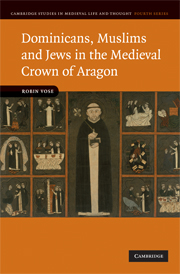Book contents
- Frontmatter
- Contents
- Acknowledgments
- List of abbreviations
- Names and terminology
- Map 1
- Map 2
- INTRODUCTION
- Part I Context
- Part II Contacts
- 4 TEACHING TRUTH
- 5 DESTROYING ERROR
- 6 WORKERS IN THE VINEYARD OF THE LORD
- 7 DIPLOMACY AND ESPIONAGE
- 8 THE COMPLEXITIES OF EVERYDAY LIFE
- CONCLUSIONS
- Appendix Dominican studia
- Bibliography
- Index
8 - THE COMPLEXITIES OF EVERYDAY LIFE
Published online by Cambridge University Press: 13 August 2009
- Frontmatter
- Contents
- Acknowledgments
- List of abbreviations
- Names and terminology
- Map 1
- Map 2
- INTRODUCTION
- Part I Context
- Part II Contacts
- 4 TEACHING TRUTH
- 5 DESTROYING ERROR
- 6 WORKERS IN THE VINEYARD OF THE LORD
- 7 DIPLOMACY AND ESPIONAGE
- 8 THE COMPLEXITIES OF EVERYDAY LIFE
- CONCLUSIONS
- Appendix Dominican studia
- Bibliography
- Index
Summary
Throughout this book, examples have been provided to highlight and examine the various ways in which medieval Dominicans sought to approach, address, coerce or otherwise interact with Jewish or Muslim populations in the Crown of Aragon and its surrounding territories. Starting with their basic ideals of universal evangelical mission in imitation of the apostles, these mendicant friars set out to preach what they took to be theological truth to all who would listen. At the same time they wanted to destroy what they took to be opposing theological errors, protecting the less well-educated or less wholly faithful from their pernicious effects. At certain specific times and under certain specific conditions this meant approaching Jews and/or Muslims, whether directly in person or through written argument, hoping such unbelievers could somehow be brought to see the light of Christian faith. Yet it has also become apparent, I hope, that this sort of external mission was the exception rather than the norm. For the most part medieval Dominicans were neither able nor particularly willing to work toward the conversion of non-Christians. It would be a distortion of history to take their few theoretical statements on mission, combined with an equally few actual examples of proselytizing behavior, and conclude that “serious missionizing” characterized relations between Dominicans and non-Christians throughout the Middle Ages and into the Modern period.
- Type
- Chapter
- Information
- Dominicans, Muslims and Jews in the Medieval Crown of Aragon , pp. 250 - 256Publisher: Cambridge University PressPrint publication year: 2009



